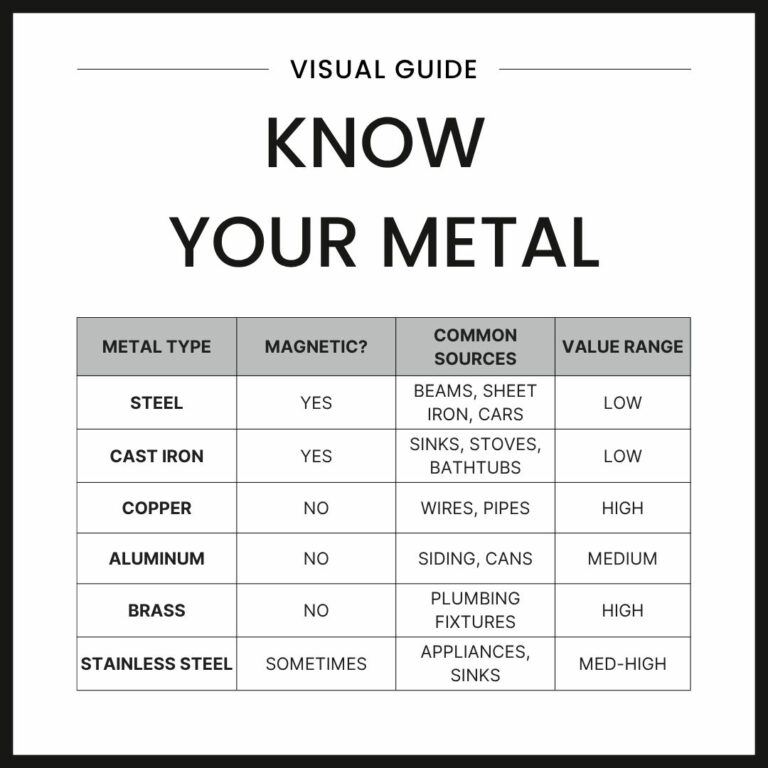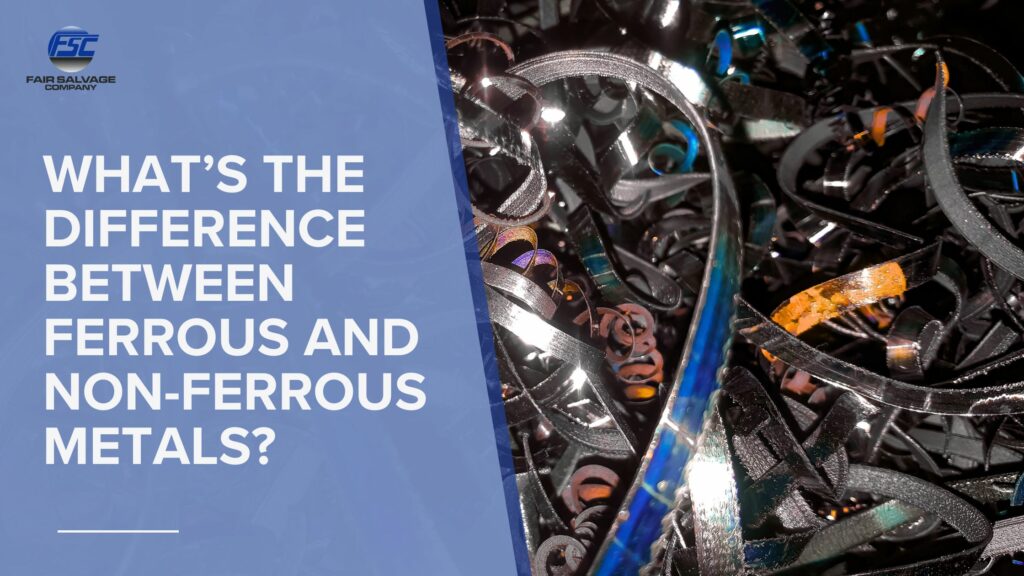you’re cleaning up a job site, clearing out the barn, or managing industrial scrap, knowing the difference between ferrous vs non-ferrous metals isn’t just trivia—it’s how you get the most value for your materials. At Fair Salvage Company, we’ve helped thousands of Mid-Michigan scrappers, farmers, and contractors earn more by knowing exactly what they’re bringing in—and how to separate it.
Whether you’re new to recycling or a seasoned scrapper, understanding the differences between metal types is the first step to maximizing your scrap metal value. Let’s break it down.
Ferrous vs Non-Ferrous Metals: What’s the Big Deal?
The main difference comes down to one thing: iron content.
- Ferrous metals contain iron. Think steel, cast iron, and wrought iron.
- Non-ferrous metals do not contain iron. Think copper, brass, aluminum, and stainless steel (sometimes).
This difference affects everything from how the metals are used in manufacturing to how much you can earn when recycling them.
Ferrous Metals: Heavy, Magnetic, and Common
Ferrous metals are often used in construction and industrial applications because of their strength and durability.
Examples of ferrous metals include:
- Steel beams from construction sites
- Cast iron piping or old bathtubs
- Appliances like washers and dryers
- Sheet iron, one of the most common scrap categories we process
How to tell if it’s ferrous:
Try a magnet! If it sticks, it’s almost certainly a ferrous metal.
Recycling tip:
Ferrous metals are typically lower in value per pound, but because they’re so common and heavy, the payout can still be significant. For updated prices, check out our Current Scrap Metal Prices.
Non-Ferrous Metals: Lightweight, Non-Magnetic, and High-Value
Non-ferrous metals are prized in recycling because of their versatility and resistance to corrosion—and they’re typically worth more per pound.
Examples of non-ferrous metals include:
- Copper wiring from electrical jobs
- Aluminum siding or cans
- Brass plumbing fittings
- Lead, often found in batteries
- Stainless steel, when it’s non-magnetic (contains more nickel)
Recycling tip:
Because of their higher value, separating non-ferrous metals from ferrous metals before bringing them to the yard can make a big difference in your payout.
Why Knowing the Difference Pays Off
Let’s say you’re a contractor finishing up a remodel. You’ve got a mix of copper wire, cast iron sinks, steel studs, and aluminum siding. If you toss it all together, you’ll likely get paid the mixed scrap rate—usually much lower.
But if you separate and identify the ferrous vs non-ferrous metals, you unlock better pricing across the board.
Here’s how smart scrappers do it:
- Sort materials on-site as you go.
- Use magnets to separate iron-based items.
- Label containers for easy identification.
- Work with a yard that pays honestly and clearly.
Need help? That’s what we’re here for. Learn more about how prices change by material type in our blog: What Are the Current Scrap Metal Prices?
The Fair Salvage Approach: Scrap Smarter, Earn Bigger
At Fair Salvage Company, we believe in transparency, fair pricing, and guiding our customers to make the most of their scrap. Our On-Site Scrap Container Program is perfect for busy job sites or farms where materials pile up fast.
With container sizes ranging from 9 to 60 yards, we:
- Deliver the container right to your site
- Pick it up within 48 hours when it’s ready
- Pay based on real-time pricing with our No Secrets Program
“We’ve helped clients go from a cluttered yard full of scrap to clean space and a check in hand—often within the same week.”
— Jon Fair, Fair Salvage Company
Want to see where your nearest yard is? Visit Our Locations

Ready to Get the Best Price for Your Scrap?
Whether you’re a homeowner cleaning out the garage or a contractor with constant metal turnover, knowing the difference between ferrous vs non-ferrous metals is the key to higher payouts and faster recycling.
Fair Salvage is here to help every step of the way—with locations in Clare, Chase, and Montcalm, expert staff, and a commitment to honesty and efficiency.
👉 Request a Quote Today and start turning your scrap into real value.

